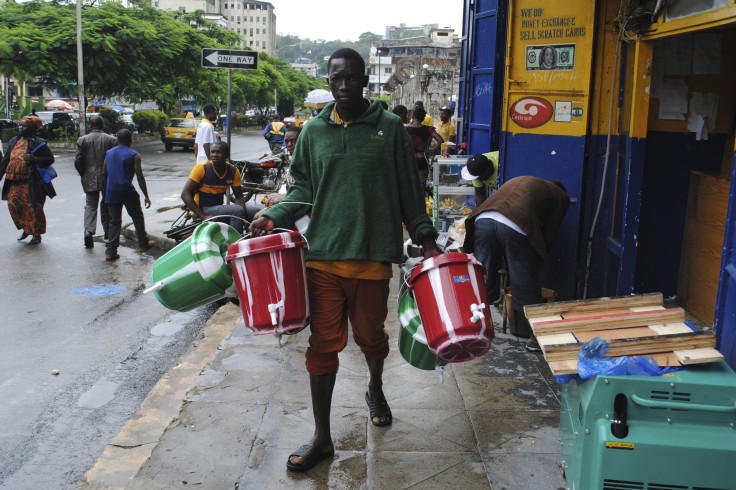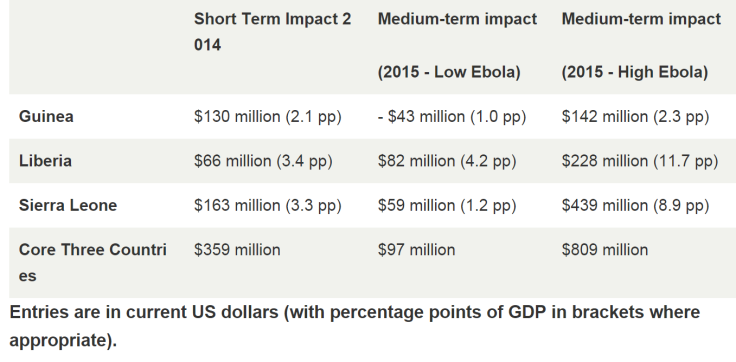Ebola Outbreak 2014: Biggest Economic Losses Fueled By Fear, Experts Say

The Ebola outbreak has already killed at least 2,622 people and shows no signs of stopping. And experts say the economic devastation will continue far into next year, due in large part to growing fears among business owners, farmers and policymakers.
“The largest economic effects of the crisis are not the direct costs,” reads a recent report from the World Bank outlining the issue, “but rather those resulting from changes in behavior -- driven by fear -- which have resulted in generally lower demands for goods and services and consequently lower domestic income and employment.”
Local governments, foreign states and international organizations have already spent millions of dollars and will require billions to contain the largest Ebola outbreak in history. But these numbers are small in comparison to the economic slowdown expected for Sierra Leone, Guinea and Liberia as commerce grinds to a halt while increasing uneasiness begins to affect the markets. World Bank analysts wrote that if the disease is not contained shortly, problems with food shortages, panic buying and speculation will continue to wrack the already-fragile economies of the affected countries.
In the short term, World Bank analysts expect Ebola to cost Liberia roughly $93 million, about 4.7 percent of its entire gross domestic product. By 2015 this could increase to $228 million if the outbreak isn’t stopped soon. They also predict that the country’s economic growth could be reduced from 6.8 percent to -4.9 percent.

Exchange rates in all three countries have become particularly volatile since June “fueled by uncertainty and some capital flight,” according to the report.
During the H1N1 flu epidemic of 2009, economists say that 80 to 90 percent of its total fiscal impact was caused by these kinds of “behavioral effects.” People who may not be directly affected are still acting especially cautious, which can have a major impact on business around the continent.
For example, when the government of Côte d’Ivoire closed its border with Liberia and Guinea, it restricted movement of cocoa exporters and statisticians who calculate forecasts, which means they won’t be able to make accurate forecasts, which could adversely impact exports in the country, according to Anna Rosenberg, sub-Saharan Africa specialist at Frontier Strategy Group, an advisory for multinational companies.
“Despite the scary headlines, businesses must differentiate fact from fear in order to assess the virus’ potential impact on their West African operations,” Rosenberg wrote in a blog post last week.
In short, in fearing Ebola people are afraid to associate with others, go to work and travel, which slows down the labor force and general production. Meanwhile, local governments and policymakers are closing down major transport hubs.
And the effect isn’t limited to Ebola-affected countries, either.
“‘Freaking out’ would be a good way to put it,” one local representative of an international organization, told Rosenberg, talking about local businesses in Accra, Ghana, which has reported no confirmed cases of the disease. “While they are not changing strategies, they are definitely losing productivity as they’re putting all kinds of people just on monitoring what’s going on in neighboring countries, having daily briefings on Ebola news, etc.”
In countries such as Nigeria, which has only had a handful of cases, the fear has been expensive. Rosenberg writes that “panic over the Ebola outbreak” will likely cost the country $2 billion in the third quarter of this year as industries such as aviation, hospitality, tourism and trade get hit hard.
“The sooner we get an adequate containment response and decrease the level of fear and uncertainty, the faster we can blunt Ebola’s economic impact,” World Bank Group President Jim Yong Kim said in a Wednesday statement.
© Copyright IBTimes 2024. All rights reserved.












